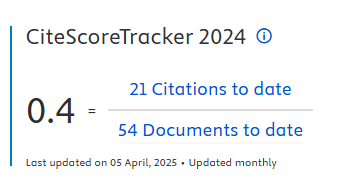Eco-innovation: opportunities, challenges, and advances in current research
DOI:
https://doi.org/10.5585/2024.26847Keywords:
editorial commentary, eco-innovation, eco-innovation research, opportunities and challenges in eco-innovationAbstract
The objective of this editorial in the International Journal of Innovation (IJI) is to share reflections on eco-innovation, highlighting the advances and perspectives in current research, emphasizing the opportunities and challenges of organizations identified by researchers in their studies. Eco-innovation is important for sustainable development as it promotes business practices that combine economic performance and environmental responsibility. This editorial discusses current research on the factors driving eco-innovation adoption, its economic and environmental implications, and how its intersection with internationalization can enhance benefits. Furthermore, we explore the opportunities and challenges, such as the need for favorable public policies and interdisciplinary collaboration. We invite researchers to submit their studies to the IJI to advance the field of eco-innovation.
Downloads
References
Albino, V., Ardito, L., Dangelico, R. M., & Petruzzelli, A. M. (2014). Understanding the development trends of low-carbon energy technologies: A patent analysis. Applied Energy, 135, 836-854.
Berkhout, F. (2011). Eco-innovation: reflections on an evolving research agenda. International Journal of Technology, Policy and Management, 11(3/4), 191-197.
Cai, W., & Li, G. (2018). The drivers of eco-innovation and its impact on performance: Evidence from China. Journal of Cleaner Production, 176, 110-118.
Chen, Y., Zhou, Y., Raza, S. A., & Sarwar, S. (2024). What we learn from nexus between greener growth and ENERGY‐RELATED emissions: Sustainability perspective evidence in context of financial globalization. Geological Journal, 59(2), 595–611.
Carrillo-Hermosilla, J., del Río, P., & Könnölä, T. (2009). Eco-innovation: When sustainability and competitiveness shake hands. Palgrave Macmillan.
Duan, D., & Liu, K. (2023). Do financial inclusion, natural resources and green innovation affect the sustainable environment in resource-rich economies. Resources Policy, 86.
Ebadian, M., van Dyk, S., McMillan, J., & Saddler, J. (2020). Biofuels policies that have encouraged their production and use: An international perspective. ENERGY POLICY, 147.
Fatma, N., & Haleem, A. (2023). Exploring the nexus of eco-innovation and sustainable development: A bibliometric review and analysis. Sustainability, 15(16), 12281.
Fethi, S., & Rahuma, A. (2020). The impact of eco-innovation on CO2 emission reductions: Evidence from selected petroleum companies. Structural Change and Economic Dynamics, 53, 108-115.
Haller, A.-P., Ștefănică, M., Butnaru, G. I., & Butnaru, R. C. (2023). Climate neutrality through economic growth, digitalisation, eco-innovation and renewable energy in European countries. Kybernetes, 53(4), 1250-1280.
Hartmann, J., Inkpen, A., & Ramaswamy, K. (2022). An FsQCA exploration of multiple paths to ecological innovation adoption in European transportation. Journal of World Business, 57(5), 101327.
He, F., Miao, X., Wong, C., & Lee, S. (2018). Contemporary corporate eco-innovation research: A systematic review. Journal of Cleaner Production, 174, 502-526.
Hojnik, J., & Ruzzier, M. (2016). What drives eco-innovation? A review of an emerging literature. Environmental Innovation and Societal Transitions, 19, 31-41.
Khan, K. A., Alshahari, E. A., Akhayere, E., Kavaz, D., & Adebayo, T. S. (2024). Climate policy uncertainty and renewable energy consumption at crossroads: Designing SDG policies for the United States. International Journal of Sustainable Development & World Ecology, 1–18.
Khan, A., & Idrees, A. S. (2023). Environmental impact of multidimensional eco-innovation adoption: an empirical evidence from European Union. Journal of Environmental Economics and Policy, 13(1), 17–33.
Khaw, K. W., Camilleri, M., Tiberius, V., Alnoor, A., & Zaidan, A. S. (2023). Benchmarking electric power companies’ sustainability and circular economy behaviors: Using a hybrid PLS-SEM and MCDM approach. Environment, Development and Sustainability, 26, 6561–6599.
Khurshid, A., Khan, K., & Cifuentes-Faura, J. (2023). 2030 agenda of sustainable transport: Can current progress lead towards carbon neutrality? Transportation Research Part D: Transport and Environment, 122, 103869.
Kuo, T.-C., & Smith, S. (2018). A systematic review of technologies involving eco-innovation for enterprises moving towards sustainability. Journal of Cleaner Production, 192, 207-220.
Padhan, H., Ghosh, S., & Hammoudeh, S. (2023). Renewable energy, forest cover, export diversification and ecological footprint: A machine learning application in moderating eco-innovations on agriculture in the BRICS-T economies. Environmental Science and Pollution Research, 30(35), 83771–83791.
Puertas, R., & Marti, L. (2021). Eco-innovation and determinants of GHG emissions in OECD countries. Journal of Cleaner Production, 319, 128739.
Rennings, K. (2000). Redefining innovation — eco-innovation research and the contribution from ecological economics. Ecological Economics, 32(2), 319-332.
Rodríguez-García, M., Guijarro-García, M., & Carrilero-Castillo, A. (2019). An overview of ecopreneurship, eco-innovation, and the ecological sector. Sustainability, 11(10), 2909.
Sáez-Martínez, F. J., Ferrari, G., & Mondéjar-Jiménez, J. (2015). Eco-innovation: Trends and approaches for a field of study. Innovation, 17(1), 1-5.
Sierzchula, W., Bakker, S., Maat, K., & van Wee, B. (2014). The influence of financial incentives and other socio-economic factors on electric vehicle adoption. Energy Policy, 68, 183-194.
Šūmakaris, P., Ščeulovs, D., & Korsakienė, R. (2020). Current research trends on interrelationships of eco-innovation and internationalisation: A bibliometric analysis. Journal of Risk and Financial Management, 13(5), 85.
Thakker, V., & Bakshi, B. R. (2023). Ranking Eco-Innovations to Enable a Sustainable Circular Economy with Net-Zero Emissions. ACS Sustainable Chemistry and Engineering, 11(4), 1363-1374.
Tariq, G., Sun, H., Ali, I., et al. (2022). Influence of green technology, green energy consumption, energy efficiency, trade, economic development and FDI on climate change in South Asia. Scientific Reports, 12, 16376.
Zhang, W., & Gu, F. (2021). Towards micro-level green growth: A framework to recognize corporate growth status, path and adopt eco-innovations. Sustainability (Switzerland), 13(18). MDPI.
Zhang, W., Gu, F., Zhang, M., & Zhang, X. (2020). Government support, eco-regulation and eco-innovation practices: Evidence from China's manufacturing sector. Journal of Cleaner Production, 258, 120840.
Ziółkowski, B. (2013). The World Trends in Eco-Innovation Assessment. Modern Management Review, 153-162.
Downloads
Published
How to Cite
Issue
Section
License
Copyright (c) 2024 Ana Cândida Ferreira Vieira Vieira, Priscila Rezende da Costa Costa, Marcos Ferrasso, Isabel Cristina Scafuto, Vânia Maria Jorge Nassif

This work is licensed under a Creative Commons Attribution-NonCommercial-ShareAlike 4.0 International License.
- Abstract 397
- pdf 153
- pdf (Português (Brasil)) 61











